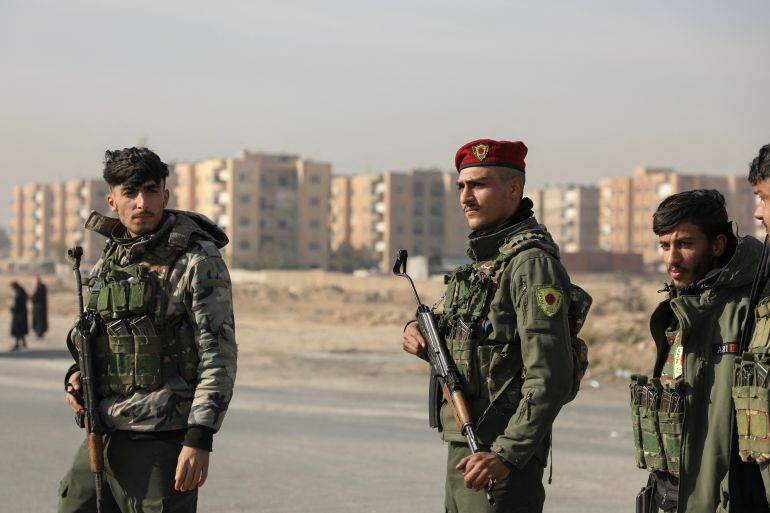American ally SDF: Not yet notified of US plan for Syria withdrawal
Questions grow over the future of 2,000 Syrian Democratic Forces troops in Syria after Bashar al-Assad’s toppling and US President Trump taking office.

Published On 5 Feb 20255 Feb 2025
The Kurdish-led Syrian Democratic Forces (SDF) says it has not been informed of plans reportedly being drawn up by the US military to withdraw its troops from Syria.
SDF spokesman Farhad Shami made the comments hours after US media reported on the plan. The armed group – a key ally of the US-led coalition fighting ISIL (ISIS) in the region – controls a large swath of northeast Syria, accounting for about one-third of Syria’s territory.
Recommended Stories
list of 3 itemsend of list
“Of course, ISIS and other malicious forces are waiting for the opportunity of the US withdrawal to reactivate and reach the state of 2014,” Shami said.
Hours earlier, NBC News reported, citing two unnamed Pentagon sources, that the administration of US President Donald Trump is drawing up plans to withdraw US troops from Syria in either 30, 60 or 90 days.
Trump was directly asked about the prospect of withdrawing troops last week, saying his administration would “make a determination on that”.
“Syria is its own mess. They got enough messes over there. They don’t need us involved in every one,” he said.
Advertisement
Trump, who continually vows an “America First” foreign policy predicated on ending US military engagement abroad, initially pushed for withdrawing US troops from Syria during his first term from 2017 to 2021.
He abandoned the plan amid pushback from within his own administration, with officials warning of a backslide in the anti-ISIL fight and the implications of abandoning Kurdish allies in the region.
But speculation over the future of US troops in Syria again grew following the toppling of Syrian President Bashar al-Assad in December by a rebel coalition spearheaded by the Hayat Tahrir al-Sham (HTS) rebel group. HTS leader Ahmed al-Sharaa has since become the interim leader of Syria.
In the wake of al-Assad’s ousting, former US President Joe Biden’s administration remained adamant that US forces would remain in Syria to prevent a resurgence of ISIL, which controlled large portions of Syria before its territorial defeat in 2019.
In December, the Pentagon said about 2,000 US military personnel remain in Syria. The number is a significant increase from the roughly 900 troops Washington had said were there in recent years. The US first deployed troops to Syria in 2014.
For its part, the Trump administration has publicly vowed to continue to target ISIL fighters across the region. Analysts have also warned that a blanket freeze on foreign aid has cut some administrative and security funding to Kurdish fighters overseeing ISIL prison camps in Syria, further risking instability.
Advertisement
Changing dynamics
Questions over the future of US soldiers in Syria come amid a wider realignment in the region following the fall of al-Assad.
On Tuesday, al-Sharaa met with Turkish President Recep Tayyip Erdogan in Ankara. Turkiye had long opposed al-Assad and supported the rebel offensive against him.
Ankara also considers several Kurdish groups in Syria, including the People’s Protection Units (YPG), to be “terrorists”. The YPG makes up a large portion of the SDF’s military wing, and fighting between the group and the Turkish-backed Syrian National Army has persisted since the fall of al-Assad.
Speaking alongside al-Sharaa at a news conference, Erdogan vowed an increased Turkish role in combatting both ISIL and Kurdish fighters. He thanked al-Sharaa for “the strong commitment” he has shown in the “fight against terrorism”.
Al-Sharaa, meanwhile, pledged increased cooperation with Turkiye “to guarantee permanent security and stability”.
In an apparent reference to the SDF, al-Sharaa added that he and Erdogan discussed “threats that prevent territorial unity in northeastern Syria”.
The Syrian leader has rejected any form of Kurdish self-rule and urged the SDF to hand over their weapons and join a unified government.
